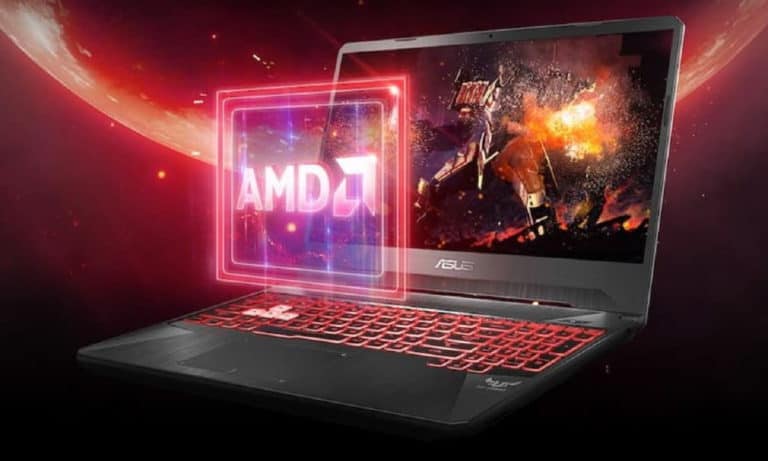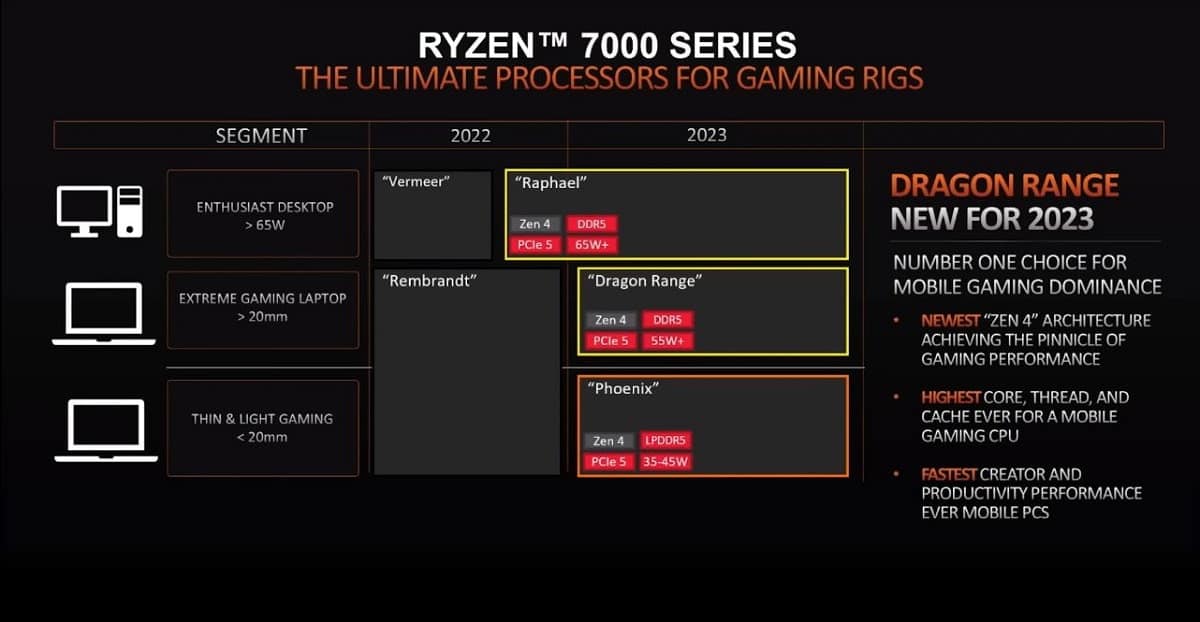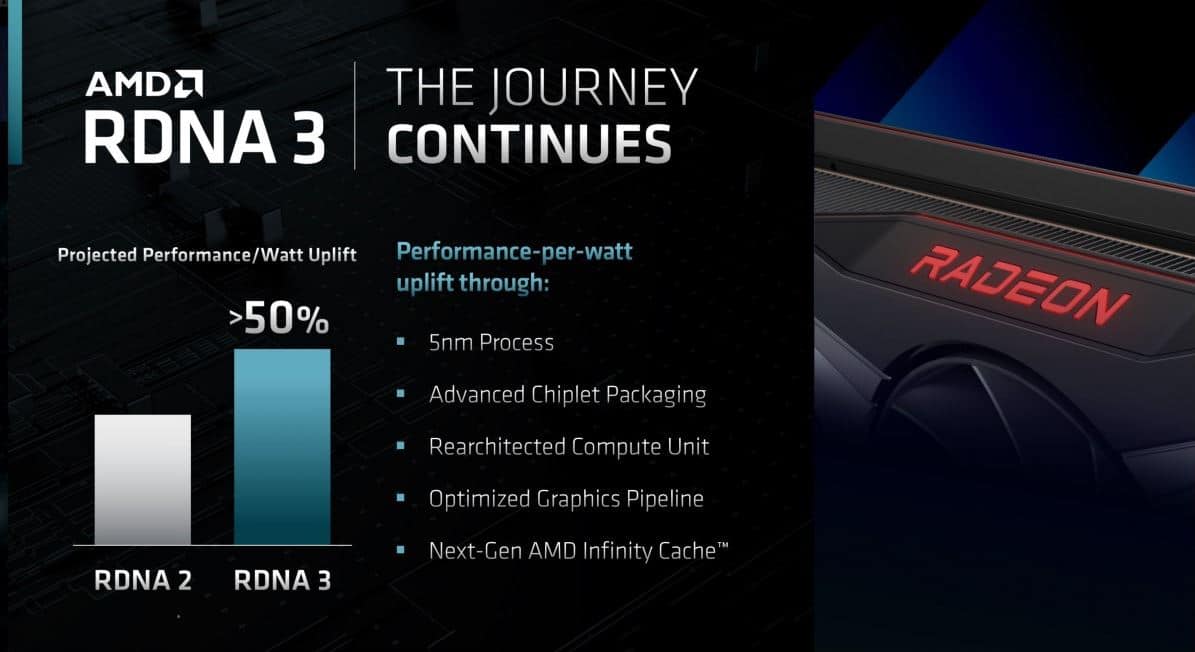Everything we know about the upcoming AMD Ryzen 7000 laptop CPUs

The AMD Ryzen 7000 series laptop CPUs are the next big thing from the red team, which looks to make a big impact on everything from general use notebooks and creative laptops to high-end gaming laptops.
Whilst the AMD Ryzen 6000 series laptops broke ground in terms of their power efficiency, meaning better battery life and gaming performance on battery, they didn’t have the computing power to take on the impressive Intel 12th gen machines in terms of raw performance. AMD is promising that the new Ryzen 7000 CPUs however will bring a massive boost to processing power with their brand new architecture, translating to more FPS-generation in games, faster render times, and improved performance across the board in single-core and multi- core workflows.
Read below for everything we know about the AMD Ryzen 7000 series laptop CPUs, whilst we await the release of the first laptop models that will be ranked on this very page.
When are AMD Ryzen 7000 series laptops coming out? Ryzen 7000 laptop release date
Whereas the desktop entries in the AMD Ryzen 7000 series are expected at some point in September 2022, AMD have stated that AMD Ryzen 7000 series laptops won’t be available until 2023, so we have a while to wait. We assume we will likely see the first AMD Ryzen 7000 laptop at some point in January 2023, but this is pure speculation at this stage.
AMD Ryzen 7000 Mobile Dragon Range vs Phoenix

AMD Ryzen 7000 Dragon Range laptop CPUs
The AMD Ryzen 7000 Dragon Range is the medium-high end of the 7000 series mobile CPUs, geared towards gamers, workstation users, and high-end creatives who will have a separate, dedicated graphics card (dGPU). As a result, they will have less focus on integrated (iGPU) power, and more on raw CPU output, in terms of higher clock speeds, CPU cores, and cache.
AMD Ryzen 7000 Phoenix laptop CPUs
Conversely, the AMD Ryzen 7000 Phoenix / Phoenix Point line of laptop CPUs/APUs will be targeted towards more general use machines, suitable for creatives and those interested in light-medium gaming at the upper end of the SKU list, with powerful iGPUs that might even compete with dedicated Nvidia RTX 3060 laptop graphics cards (white lower-powered ones), which would be impressive indeed.
The above graphic from AMD gives you some idea of how the different ranges will line up against each other and the desktop Ryzen 7000 series CPUs as well. Read on for more detail about what we know/predict these chips have in store for us.
Rumored AMD Ryzen 7000 laptop SKUs
We don’t have any confirmed information on the different SKUs in the Ryzen 7000 series mobile lineup yet, however WCCFtech, who have a decent track record of AMD predictions, have come up with the following table of potential models in the series, based on the information we do know, and we’ve added a few bits relating to the CPU core count. This includes those in both the Dragon Range and the Phoenix family of CPUs. Obviously, this table is highly subject to change as new information emerges, and should be taken with a sizable pinch of salt.
| CPU name | CPU family | Core IPS | process node | CPU core count | CPU boost clocks | GPU CU count | GPU clocks | TDP |
| AMD Ryzen 9 7980HX | Dragon Range | Zen 4 / RDNA 2 | 5nm | 16 | 4.8 – 5 GHz+ (Max) | 2 Compute Units (128 Shaders/Cores) | TBD | 55W+ (cTDP) |
| AMD Ryzen 9 7900HX | Dragon Range | Zen 4 / RDNA 2 | 5nm | 12 | 4.8 – 5 GHz+ (Max) | 2 Compute Units (128 Shaders/Cores) | TBD | 55W+ (cTDP) |
| AMD Ryzen 7 7800HX | Dragon Range | Zen 4 / RDNA 2 | 5nm | 8 | 4.8 – 5 GHz+ (Max) | 2 Compute Units (128 Shaders/Cores) | TBD | 55W+ (cTDP) |
| AMD Ryzen 5 7600HX | Dragon Range | Zen 4 / RDNA 2 | 5nm | 6 | 4.8 – 5 GHz+ (Max) | 2 Compute Units (128 Shaders/Cores) | TBD | 55W+ (cTDP) |
| AMD Ryzen 9 7980HS | Phoenix | Zen 4 / RDNA 3 | 4nm | TBD | Up To 5 GHz (Max) | 12 Compute Units (1536 Shaders/Cores) | 2.6-3.0 GHz (Max) | 35-45W (60-70W cTDP) |
| AMD Ryzen 9 7900HS | Phoenix | Zen 4 / RDNA 3 | 4nm | TBD | Up To 5 GHz (Max) | 12 Compute Units (1536 Shaders/Cores) | 2.6-3.0 GHz (Max) | 35-45W (60-70W cTDP) |
| AMD Ryzen 7 7800HS | Phoenix | Zen 4 / RDNA 3 | 4nm | TBD | Up To 5 GHz (Max) | 12 Compute Units (1536 Shaders/Cores) | 2.6-3.0 GHz (Max) | 35-45W (60-70W cTDP) |
| AMD Ryzen 5 7600HS | Phoenix | Zen 4 / RDNA 3 | 4nm | TBD | Up To 5 GHz (Max) | 12 Compute Units (1536 Shaders/Cores) | 2.6-3.0 GHz (Max) | 35-45W (60-70W cTDP) |
Things to consider if you’re thinking of buying an AMD Ryzen 7000 series laptop
The below goes into greater detail about the features of the new AMD Ryzen 7000 laptop CPUs, to help you decide whether they’re worth the wait, or if you’d rather opt for a different AMD/Intel-powered laptop sooner.
AMD Ryzen 7000 series motherboard compatibility
AMD Ryzen 7000 series desktop CPUs will require an AM5 platform motherboard with LGA 1718 socket in order to be compatible, which the company will launch at the same time as the CPUs themselves. This is the first update to the platform/socket type that AMD has done in 6 years. Whilst this is more of a thing that desktop users who are putting together their own rig have to be aware of, it gives us an insight into the new technology that Ryzen 7000 series laptops will come equipped with: expect Dual-Channel DDR5 Memory Support and a greater number of PCIe 5.0 lanes.

Zen 4 architecture, 4nm & 5nm process node
The (laptop only) AMD Ryzen 6000 series of Zen 3+ CPUs were based on an improved version of the same architecture used by the 5000 series (Zen 3), which used a 7nm process node ie 7n sized transistors. The new Zen 4 architecture from AMD predominantly use a 5nm process nodewhich means smaller transistors, meaning more can be packed onto the Integrated Circuit, therefore more power in the same sized chip and potentially greater power efficiency.
Even more impressively, the Phoneix Point line of APUs will be built on the even smaller 4nm process nodeallowing them even greater efficiency.
According to AMD the new 5nm Zen 4 architecture will offer a ‘greater than 15 percent’ improvement to single-threaded performance compared to Zen 3, although we haven’t yet heard anything in the way of multi-core performance.

RDNA 3 laptops vs RDNA 2 laptops
RDNA is the name of the architecture used by AMD in their GPUs and APUs. AMD already led the way in terms of onboard RDNA 2 graphics in their Ryzen 6000 series, but it seems like RDNA 3 will be a massive leap forward. AMD claim that the new iGPU (integrated GPU) technology offers 50% more performance for the same amount of Wattage, but stress that they’re looking to push the boat on gaming performance rather than reducing power draw, meaning substantially more shaders/CU cores as you can see in the table above for the Phoenix Point line. As stated by the leaker Greymon55the most powerful of these in the Phoenix APUs may be comparable (at least, not far off) to a mobile version of an RTX 3060, albeit one with a lower 60W TGP (higher wattage ones would still perform better).

AMD Ryzen 7000 series laptops vs Intel 13th gen laptops
We don’t quite yet know how the Ryzen 7000 series will compare to the upcoming Intel 13th gen CPUs in terms of raw power, but the signs are that the latest generation from the blue team won’t quite be the massive leap forward that the Intel 12th gen laptop CPUs were (and the desktop versions). The 12th gen series pretty much dominated the AMD Ryzen 6000 series in both single-core and multi-core performance, losing out to the red team’s efforts only in terms of power efficiency (Ryzen 6000 laptops invariably had superior battery life) and gaming performance on battery power It seems this time it’s AMD’s turn to potentially leap ahead with its new Zen 4 architecture. We’ll have to wait and see how Intel’s line will compete.
Final Word
We’ll be updating this page with all the latest AMD Ryzen 7000 series laptop info as it comes out, and eventually (come early 2023) listing the best of the series on the market, to fit your specific needs. Until then, make sure you stay locked onto WePC for all the latest AMD, Intel, and Nvidia tech news.